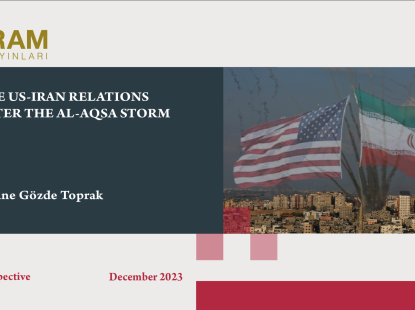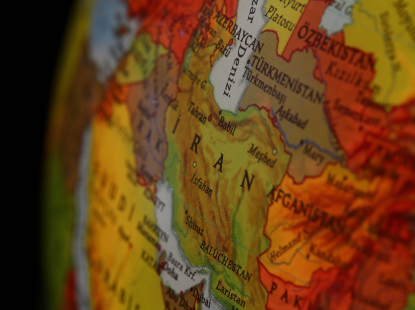Chinese Media Coverage of the Recent Protests in Iran
Protests erupted in Mashhad, Iran's second-largest city, on December 28 following a massive hike in prices of various food items. With Iran’s crippling economy, resulting from international sanctions and various circumstances, and an increasing unemployment ratio, the sudden jump in food prices ignited an already frustrated youth. Protests rapidly spread to other cities throughout the country and it became breaking news worldwide.
China, a natural ally of Iran, was relatively silent on this issue compared to other major world powers. The only official Chinese view is China’s foreign ministry spokesperson Geng Shuang’s one-line answer to a question about unrest in Iran. Geng said, “China hopes that Iran can maintain stability and achieve development.”
Due to its energy need, China gives great importance to Iran. About 80 percent of Iran’s total export to China is oil. Furthermore, Iran plays a vital role in China's iconic Belt and Road Initiative (BRI) project. Chinese President Xi Jinping visited Tehran in January 2016 and met Iran's Supreme Leader Ali Khamenei and President Hassan Rouhani and leaders of both countries agreed to chalk out a 10-year roadmap for China-Iran cooperation. Under the project of the New Silk Road, both countries signed 17 projects in banking, communication, culture, energy, finance, and science and technology. Earlier, in May 2014, Iranian President Hassan Rouhani paid an official visit to Beijing. In June last year, the Iranian military and the Chinese People’s Liberation Army (PLA) were engaged in joint drills in the Persian Gulf. Till the first half of 2017, bilateral trade between China and Iran reached $18 billion with a 31 percent increase compared to 2016.
Chinese media outlets were full of the official news from Iran, although, there was an apparent bias.
Chinese media outlets were full of the official news from Iran, although, there was an apparent bias. Several official Chinese publications, including People's Daily, Global Times, Xinhua and their Chinese version, mostly focus on day-to-day affairs and news items and published fewer opinionated articles and editorials. These articles were based on either Iran’s official news agency or Xinhua.
Chinese coverage of the Iranian protests can be classified into three categories; 1) Incident based: such as, what happened and where? How many people are killed and injured, etc., 2) Statement based: Official statements of Iranian or foreigner leaders, and 3) News Analysis: Following the official line of the Iranian government, some analytical articles, columns, and editorials in which Chinese media supported the Iranian regime.
On January 3 the Global Times published an article written by Shu Meng with the title “Foreign meddling not needed in Iran unrest.” The article accuses the US and Saudi Arabia of the unrest in Iran and additionally blames the worst economic situation in the country for creating dissatisfaction among people. The writer thinks that people are dissatisfied with the regime, and the support and help of external forces could spread the fire. At the same time, she thinks that these demonstrations do not pose any threat to the regime. In the meantime, the writer also criticized the internal factors and traditional style of governance in the country, telling that “After all, the internal causes are fundamental to the turmoil.”
A similar article was published in the state-run China Daily on January 1; citing Trump’s tweet, this article also targeted the US for instigating violence in Iran. Furthermore, the article asked the US and other major players in the area to fulfil its role in maintaining peace and stability in Iran and accused the US of creating chaos in Iraq through military intervention and helping the Arab Spring uprising in other countries.
China's main official paper Renmin Ribao ran a detailed story on January 3, in which it explained the background of the protests, the construction of Iranian society, culture and governance. This article also criticized Trump's attempt to interfere in Iran’s domestic affairs. Another Global Times article explains the nature of the protests and basic issues behind these protests. The writer, who is a PhD scholar at the Hebrew University of Jerusalem, recognizes that Iran is facing a high rate of inflation and unemployment. It also says that Iran is involved several issues such as Syria, Iraq, etc. and it is one of the reasons behind the grave economic situation. Without naming any country, the writer also accused the sanctions slapped on Iran and 'governance by religious law' for destroying the country's economy and creating such chaos.
On January 8, Renmin Ribao published another article which questioned why the US jumped to comment about the situation in Iran. The article also mentioned Iran's nuclear issue and its tussle with the US in this regard. While mentioning recent protests from time to time the article focuses on Iran-US relations.
Global Times published another story, written by Yang Sheng, based on the views of various Chinese analysts. Most of these analysts were of the opinion that if Iran can 'satisfy' its people's economic needs and continue on the path of development then no external forces can create a problem in the country. The writer also pointed out that these protests will not be fatal for the regime and there will not be any adverse effect on the Belt and Road Initiative.
An editorial by the Global Times with the headline “Iran chaos reflects US declining authority” on January 2, heavily takes on the US and other forces for interfering with internal affairs of Iran and suggests that Iran alone should solve its problems. According to the writer “How Iran solves the crisis should be determined on its own. Tehran can ignore Washington's stance and make choices that benefit the country and its people most.” It also blamed the US for provoking protesters against the government and said that the US will support protesters unconditionally if it turned to be ‘a violent revolution’.
“Iran turmoil offers lesson for non-Western nations” is another article published by the Global Times on January 1. It says that Western countries rejoice when they see turmoil in Iran. While giving lessons to Iran on how to deal with and avoid such situations, the writer accused Western countries of supporting unrest in non-Western countries, most of the time, and said “But the government systems of this world are not up to the West to decide. Each country's history, culture, economy and social development differ from another. The one-size-fits-all Western political standard will only create blood and pain and is not in the interests of the general public in developing countries.”
Though there were frequent reports in China's official media like Xinhua and People's Daily on the unrest in Iran, a US-based news portal focusing on China, The China Digital Times, claimed that a censorship instruction related to reporting regarding Iranian protests has been leaked which says “Do not report any more on the demonstrations in Iran. Follow-up reports require further notice from superiors. Relevant information that has already been transmitted and is from an authoritative source and is compliant should no longer be hyped but do not delete it.”
Reports suggest that Chinese citizens were actively cheering Iranian protesters on Twitter and Weibo.
Reports suggest that Chinese citizens were actively cheering Iranian protesters on Twitter and Weibo. Commenting on the issue, New York Times Hong Kong correspondent Austin Ramzy said: “Chinese activist Twitter-sphere has been very focused on the Iran protests, cheering the expanding demonstrations, with the hope that something like this could happen at home.”
China took this opportunity to criticise the US because almost every article on this issue talks about the US influence and Trump’s tweet. Iranian leaders also accused Israel and Saudi Arabia of the violence and protests. Israeli Prime Minister Benjamin Netanyahu supported the protests in his message on Facebook and Twitter. However, apart from passing reference, the whole narrative of the Chinese media is silent on them.
One can easily understand the motives behind China’s concerns. It is a common phenomenon in authoritative countries to discourage such uprising and China was doing the same. Meanwhile, as a huge investor, China has another reason to be concerned about the political stability of Iran and it is a genuine concern.
The views expressed in this article are the authors’ own and do not necessarily reflect IRAM’s editorial policy.











